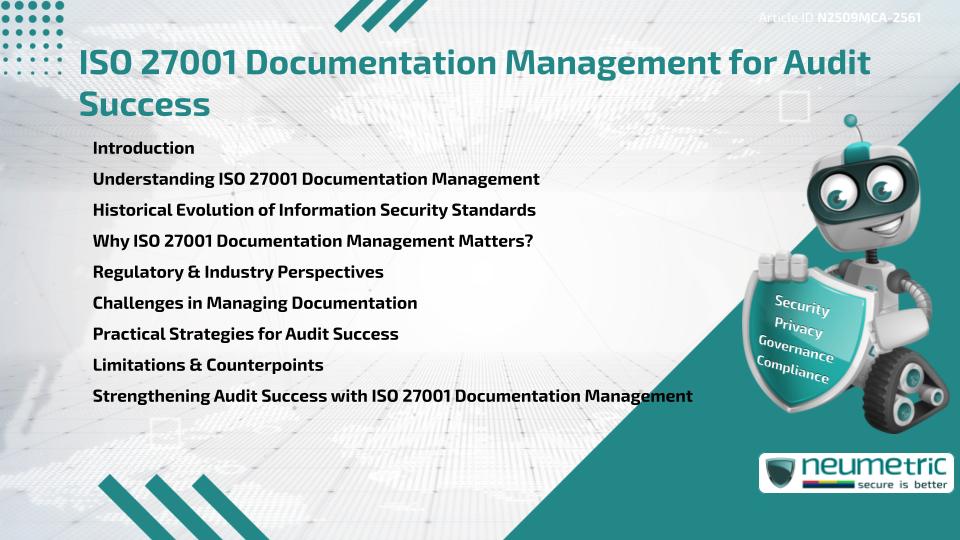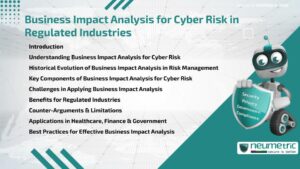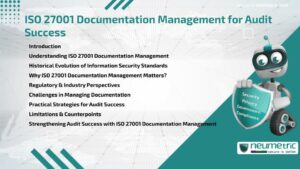Table of Contents
ToggleIntroduction
ISO 27001 Documentation Management is a critical component of achieving Audit success. The ISO 27001 Certification requires organisations to demonstrate robust Information Security practices, supported by well-structured documents such as Policies, Procedures & Risk Assessments. Without effective Documentation Management, organisations Risk Non-Conformities during Audits, delays in Certification & potential Security Gaps. By adopting Best Practices in ISO 27001 Documentation Management, organisations can ensure Compliance, improve Efficiency & build lasting Customer Trust.
Understanding ISO 27001 Documentation Management
ISO 27001 Documentation Management involves creating, maintaining & controlling documents required to prove Compliance with the Standard. These documents include:
- Information Security Policies
- Risk Assessment & Risk Treatment Plans
- Access Controls & Security Measures
- Records of Security Incidents & Corrective Actions
- Internal & External Audits reports
Proper management ensures documents are up-to-date, easily accessible & aligned with Ethical & Regulatory Standards. For Auditors, clear documentation provides Evidence that the organisation is adhering to its Information Security Management System [ISMS].
Historical Evolution of Information Security Standards
The demand for structured documentation emerged alongside the rise of Information Security as a business priority. Early frameworks such as BS 7799 laid the foundation for ISO 27001, which formalised requirements for systematic documentation. Over time, organisations learned that documentation was not just a bureaucratic task but a means to demonstrate Transparency & Accountability. Today, ISO 27001 Documentation Management is considered central to Audit readiness.
Why ISO 27001 Documentation Management Matters?
ISO 27001 Documentation Management is vital for multiple reasons:
- Audit Readiness: Well-maintained documentation demonstrates Compliance & reduces Audit delays.
- Risk Reduction: Records of Security Incidents & Corrective Actions ensure Continuous Improvement.
- Regulatory Standards: ISO 27001 Certification aligns with global Regulatory Compliance frameworks.
- Customer Trust: Clients & Partners value organisations that maintain transparent & well-documented Security Controls.
In short, documentation provides the Evidence needed to prove that Security Frameworks are functioning effectively.
Regulatory & Industry Perspectives
Regulatory bodies & Certification Bodies place strong emphasis on documentation. ISO 27001 Certification requires proof of documented Policies, Technologies & Processes as part of the ISMS. Similarly, GDPR Compliance & SOC 2 Certification demand detailed Compliance Reports & Audit Trails.
From an industry perspective, Documentation Management is now seen as both a Compliance Requirement & a best practice for maintaining Business Continuity & demonstrating strong Governance Standards.
Challenges in Managing Documentation
While critical, ISO 27001 Documentation Management poses challenges:
- Volume: Large organisations may need to manage thousands of documents.
- Version Control: Ensuring documents are current & controlled can be difficult.
- Employee Training: Staff may not understand their role in maintaining documentation.
- Integration: Linking documentation with other Security Controls requires planning.
These challenges highlight the need for effective systems & processes.
Practical Strategies for Audit Success
Organisations can strengthen ISO 27001 Documentation Management by:
- Implementing secure document management systems with Access Controls.
- Conducting regular Internal & External Audits to ensure accuracy.
- Training Employees to follow standardised procedures for documentation.
- Using Continuous Monitoring & Improvement to keep documents updated.
- Collaborating with Certification Bodies for guidance on documentation expectations.
These strategies reduce the Risk of Non-Conformities & support smoother Certification processes.
Limitations & Counterpoints
Some critics argue that Documentation Management can become overly burdensome, leading organisations to focus on paperwork rather than practical Security Measures. Others caution against creating documents merely for Audits, as this can create gaps between written Policies & actual practices.
However, when documentation is aligned with day-to-day operations, it enhances both Compliance & real Security.
Strengthening Audit Success with ISO 27001 Documentation Management
ISO 27001 Documentation Management is not just about passing Audits-it is about embedding Security Controls into organisational culture. By ensuring documents are accurate, accessible & regularly updated, organisations can demonstrate Transparency & Accountability, reduce Risks & maintain Customer Trust.
When effectively implemented, ISO 27001 Documentation Management lays the foundation for Audit success & long-term Information Security resilience.
Takeaways
- ISO 27001 Documentation Management is essential for Audit readiness.
- Proper documentation demonstrates Compliance & supports Risk Reduction.
- Regulatory Standards demand accurate & controlled documentation.
- Challenges include Volume, Version control & Employee awareness.
- Practical strategies include Secure systems, Training & Continuous Improvement.
FAQ
What is ISO 27001 Documentation Management?
It refers to creating, controlling & maintaining documents required to comply with the ISO 27001 Certification.
Why is ISO 27001 Documentation Management important?
It ensures Audit readiness, supports Risk Reduction & demonstrates Compliance with Regulatory Standards.
What documents are required for ISO 27001 Documentation Management?
Policies, Risk Assessments, Access Controls, Incident Reports & Audit Findings.
What challenges exist in ISO 27001 Documentation Management?
Managing Volume, Version control, training Employees & integrating with Security Controls.
How can organisations improve ISO 27001 Documentation Management?
By using secure systems, conducting regular Audits, Training staff & applying Continuous Monitoring & Improvement.
Does documentation alone ensure Compliance?
No, documentation must align with actual practices to ensure Security Controls are effective.
Which standards rely on strong Documentation Management?
ISO 27001 Certification, SOC 2 Certification & GDPR Compliance all depend heavily on documentation.
Need help for Security, Privacy, Governance & VAPT?
Neumetric provides organisations the necessary help to achieve their Cybersecurity, Compliance, Governance, Privacy, Certifications & Pentesting needs.
Organisations & Businesses, specifically those which provide SaaS & AI Solutions in the Fintech, BFSI & other regulated sectors, usually need a Cybersecurity Partner for meeting & maintaining the ongoing Security & Privacy needs & requirements of their Enterprise Clients & Privacy conscious Customers.
SOC 2, ISO 27001, ISO 42001, NIST, HIPAA, HECVAT, EU GDPR are some of the Frameworks that are served by Fusion – a SaaS, multimodular, multitenant, centralised, automated, Cybersecurity & Compliance Management system.
Neumetric also provides Expert Services for technical security which covers VAPT for Web Applications, APIs, iOS & Android Mobile Apps, Security Testing for AWS & other Cloud Environments & Cloud Infrastructure & other similar scopes.
Reach out to us by Email or filling out the Contact Form…





